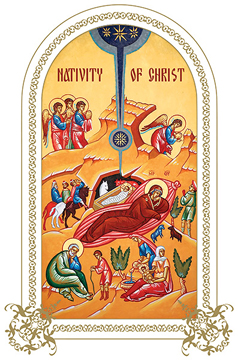A Christmas Message from the OCA Chancellor
 |
There are only a few days left till Christmas. For most of us, that means there is little time left to prepare for the holiday. As Orthodox Christians, we now enter into the Prefeast of the Nativity of our Lord. Unfortunately, the services for the Prefeast are either seldom done or not well attended, and so the treasures contained in the liturgical hymns for those days are only partially known. A theme repeated within those hymns is that Jesus Christ comes down “to dwell with his creatures,” that He “descends” to be “born in a cave,” that He “willing becomes a servant,” and that as a babe He “lies with brute beasts.” One hymn states that the gifts of the Wise Men anticipate the fragrant oils and spices with which the crucified Christ will be wrapped for His burial. The birth of Jesus Christ is thus seen as the lowering and humiliation of the Son of God, even His descent into the depths of human life. The theological term for this condescension of Christ is kenosis, from the Greek word meaning “emptying.” The Church brings the kenotic Christ directly to our attention during the services of Holy Week and Pascha. However even at Christmas time, as we prepare to joyfully celebrate the birth of Our Lord, we are already called on to contemplate the Lord’s humiliation and kenosis.
What does this mean to us in practical terms? It means that even during this time of merriment, laughter, and celebration, we need to remember the destitution, the poverty, the hardships, the misfortunes, the illnesses, and the misery that is all around us. In fact, we need not look too far to see this. The entire world is caught up in strife and tribulation. War, animosity and recurring violence are constant news. Our North American culture blindly pursues covetousness, unrestrained pleasure and mindless diversions. Spiritually speaking, we are all “kenotically” affected, pulled by the gravity of sin and lowered to the miserable depths. All of us have inclinations to sin and bad habits, which seem so difficult to overcome. What is worse, we unconsciously nurture those bad habits in our young people. We perpetuate envy, pettiness and hardness of heart, and we all have the most difficult time in forgiving others.
The Orthodox Church’s liturgical hymns are a critical reminder that Our Lord descends kenotically because we are all descending. He comes to the lowly because we all are cast down low. He humiliates Himself voluntarily, because we humiliate ourselves constantly. Those uplifting hymns of Christmas are interspersed with references to Our Lord’s condescension because the Feast itself cannot be understood otherwise. If human misery did not exist, there would neither be the need for, nor the joy derived from, Christ’s Incarnation. While we may prefer to deny that misery, only through acknowledgment of it does Christmas mean anything at all.
The timeless story of the Nativity takes place in the context of darkness and the birth of Jesus Christ takes place in a cavern. While in the heavens the profound angelic proclamation rings out, “Glory to God on high, and on earth peace to men of good will.” Into the world full of the misery, comes the good news that darkness cannot overcome light, and evil cannot destroy good. The struggle for peace is not yet over, but the victory is predestined. The establishment of good will requires continuing effort, but we now proceed with confidence. And every time we receive the Holy Eucharist, as many of us will on Christmas Day, we know that despite all the hardships, and illnesses and difficulties we face, the birth of Christ has made possible the acquisition of comforting grace.
The Church itself has survived wars, persecutions, external and internal conflicts but it continues to declare the glorious message of “peace and good will.” This message endures in the hearts of good Christian people with miraculous power. This is also the message that we now again prepare to sing out together with you. On behalf of those of us who are presently working at the OCA Chancery, I would like to extend our festal greetings to all. Inasmuch as we are still in the period of preparation, during which we are encouraged to make a Confession to God, and since repentance also means asking forgiveness of others, all of us who work here ask your forgiveness. If we have hurt or offended you, through negligence, ignorance or lack of charity, we are truly sorry. We are making every attempt to be honest, fair and transparent. If this did not appear to be the case, we do promise to be more diligent next year.
With prayers and hope, we sincerely wish to the members of the Holy Synod, to the Metropolitan Council, to all of our men and women living the monastic life, to all of our departments, committees and commissions, to the teachers, staff and students at our seminaries, to all of the clergy and faithful members of the Orthodox Church in America, to all who have supported the Church with their time, efforts and donations, to those who agree with us and those who disagree, to our neighbors, distant and close relatives, and to all of our friends, a blessed celebration of Our Lord’s Nativity, full of Christ’s love, joy and peace.
Archpriest Alexander Garklavs
Chancellor, Orthodox Church in America
